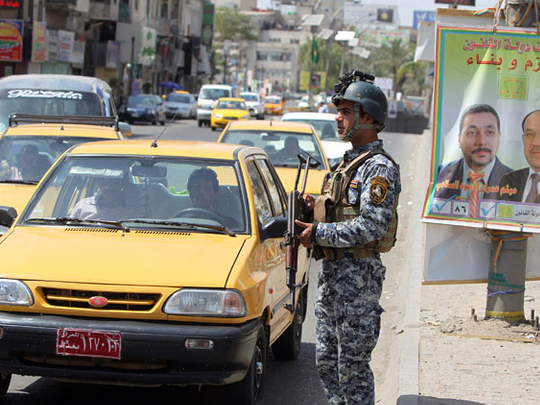
Baghdad: Iraq ramped up security on Friday on the eve of its first polls since US troops left as attacks, including a bombing at a Baghdad billiards cafe, killed 35 people in a spike in unrest before the vote.
The deadly violence just before Saturday’s provincial election raises further questions about the credibility of the polls, with 14 candidates already having been killed and a third of Iraq’s provinces not even voting amid a political crisis.
The vote is seen as a key test of Iraq’s stability and security, and will provide a crucial gauge of Prime Minister Nuri Al Maliki’s popularity ahead of general elections next year.
But attacks on Thursday and Friday that left 35 dead damaged claims that Iraq’s forces are able to maintain security for the polls.
On Thursday evening, a bombing in the west Baghdad suburb of Amriyah killed 27 people and wounded more than 50 others, officials said, while mortars and a bomb blast at mosques in Khales and Kirkuk, both north of the capital, after Friday prayers left eight more dead and 27 wounded.
The Baghdad blast hit a cafe inside a small shopping mall, typically filled with families eating at restaurants and shopping for clothes, on the main road in the predominantly Sunni neighbourhood.
The cafe itself, however, is mostly frequented by young men playing billiards and video games.
The glass windows of the mall, and of nearby shops and houses, were shattered by the blast, an AFP journalist said, while witnesses reported heavy damage inside the building itself.
Security forces restricted access to the neighbourhood and movement within, with motorists having to pass six checkpoints to enter, but the tightened searches did little to placate anger in Amriyah, where many residents accused authorities of negligence.
“If it was not them (soldiers) who did it, it was their fault,” said one resident who declined to be named. “We are surrounded by walls and checkpoints, so if it’s not them who did it, they helped because they were lazy or they did not perform the checks well.”
In Khales, four mortars struck a Sunni mosque as worshippers were leaving following mid-day Friday prayers, while a bomb detonated at a Shiite mosque in Kirkuk at around the same time.
The attacks all took place despite tougher security measures nationwide ahead of elections.
Movement is expected to be tightly-controlled on Saturday, with only pre-approved vehicles allowed on the streets and concertina wire closing off areas adjacent to schools that are being used as polling centres.
The latest deaths bring to 118 the number of people killed since Sunday, an average of around 20 per day, according to AFP figures.
No group immediately claimed responsibility for the attacks, but militants linked to Al Qaida often carry out bombings in both Sunni and Shiite neighbourhoods across Iraq, in a bid to undermine confidence in the government and security forces.
Officials and diplomats also complain that a long-running spat that has pitted Maliki against several of his erstwhile government partners has been exploited by insurgents to enhance their room for manoeuvre on the ground.
An estimated 13.8 million Iraqis are eligible to vote on Saturday for more than 8,000 candidates, with 378 seats being contested.
Meanwhile, six of Iraq’s 18 provinces will not be taking part, including two where authorities say security cannot be ensured.
Iraqi forces will be responsible for security on polling day, the first time they will be in charge without support from American or other international forces during elections since dictator Saddam Hussain was toppled in 2003.












